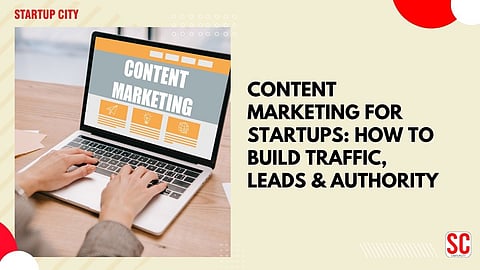

Content Marketing for Startups
What if I told you that you could attract your dream customers, build credibility, and scale your startup—without spending a single rupee on ads?
Sounds too good to be true?
Let me show you how content marketing for startups isn’t just a buzzword—it’s a powerful, proven strategy that’s helped some of the world’s biggest companies grow from garage startups to global empires.
Whether you're a first-time founder or a seasoned entrepreneur, organic growth is not only possible—it’s sustainable and scalable.
Content marketing is about creating and sharing valuable, relevant content to attract and retain a clearly defined audience.
In simpler terms: you give your audience useful information for free, and in return, they trust you, follow you, and eventually buy from you.
Cost-effective: Startups often have tight budgets. Content marketing provides long-term ROI without recurring ad spends.
Builds trust: People don’t buy from businesses—they buy from brands they trust.
Drives organic traffic: High-quality content ranks on Google and brings free traffic over time.
Educates your audience: Great content helps your audience understand their problems and see your startup as the solution.
“Traditional marketing talks at people. Content marketing talks with them.”
– Doug Kessler
Before you start writing blog posts or creating YouTube videos, ask yourself:
Do you want to generate leads?
Educate your market?
Establish authority in your niche?
Drive sign-ups or app downloads?
Be clear. Your content should serve your business goals, not just fill up your blog section.
You don’t need a full-fledged marketing department to start. You just need a clear, focused plan.
Imagine talking to a crowded room of strangers. Would anyone pay attention?
Now imagine you're speaking directly to your ideal customer—the person who needs what you offer.
Create a customer persona:
Age, gender, location
Industry or profession
Pain points
Questions they ask
Platforms they use (LinkedIn, Instagram, Quora, etc.)
In my experience, startups that invest time in understanding their audience upfront see better engagement and conversions.
Not all content is created equal. Choose formats that suit your strengths and your audience's habits.
Here are some great startup-friendly content types:
Blogs: Boost SEO, educate users
Case studies: Show results, build trust
How-to guides: Solve real problems
Email newsletters: Nurture leads over time
Videos & Reels: High engagement, especially on Instagram and YouTube Shorts
Infographics: Share complex data in a digestible way
Pro tip: Start with 1-2 formats. Focus on consistency, not perfection.
The truth? Content without SEO is like opening a store in the desert.
Here's how to make sure your content gets found:
Do keyword research: Use tools like Ubersuggest, Ahrefs, or Google Keyword Planner.
Use your main keyword (like "content marketing for startups") 3-5 times naturally.
Include secondary keywords like “inbound marketing”, “organic traffic”, “startup content strategy”, “lead generation”.
Example: If you're a health-tech startup, create blog titles like:
“10 Organic Ways to Get Patients Without Paid Ads”
“How HealthTech Startups Can Use Content to Drive Growth”
You don’t need to do everything manually. Use smart tools to save time.
Grammarly: Flawless grammar and readability
Canva: Design stunning visuals
Buffer / Hootsuite: Schedule your content
ChatGPT: Brainstorm blog titles, outlines, and ideas
AnswerThePublic: Find what your audience is searching for
1. Zerodha (India's leading discount broker)
They didn’t rely on flashy ads. Instead, they created Varsity, a free educational content platform that made them a household name among retail investors.
2. Notion (Productivity App)
They grew massively through user-generated content, tutorials, and word of mouth—all organic.
3. Mamaearth (D2C skincare brand)
Their blog and influencer-driven content strategy built massive brand recall among millennials.
One blog post can become:
A LinkedIn carousel
A YouTube explainer
A Twitter thread
An Instagram Reel
An email newsletter
Repurposing saves time and multiplies reach. Don’t let your best content die on one platform.
Creating content is just half the job. Promotion is where the magic happens.
Share on LinkedIn (great for B2B startups)
Join relevant Facebook groups and add value
Answer questions on Quora or Reddit
Collaborate with influencers or micro-creators
Email your existing customers and subscribers
Set KPIs based on your goals:
Website traffic
Leads generated
Time on page
Engagement (shares, likes, comments)
Conversion rates
Use Google Analytics, Search Console, or tools like Hotjar to track user behavior and improve content accordingly.
Content marketing is not a one-month hack. It’s a long-term strategy.
You may not see results in the first few weeks—but over time, the compounding effect kicks in.
Just like investing in mutual funds, consistency beats intensity.
The startups that win in 2025 and beyond won’t be the ones with the biggest ad budgets.
They’ll be the ones who:
Listen to their audience
Tell better stories
Provide real value before selling
So, if you’re ready to attract customers, build a brand, and grow your startup organically…
Start creating. Start sharing. Start winning.